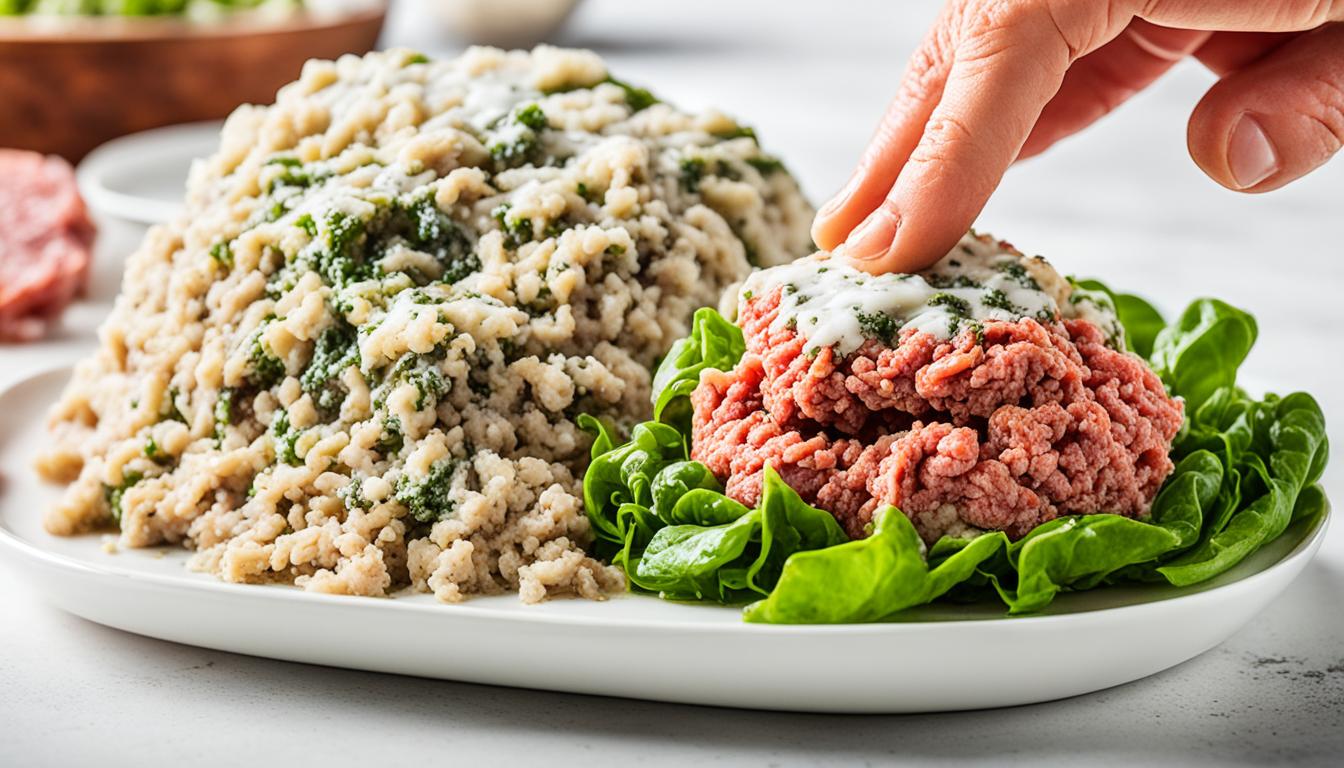Ground turkey is popular for being versatile and lean. But, it’s key to watch for spoilage signs. This ensures your safety and meal quality. Recognizing bad ground turkey helps avoid expired or contaminated meat.
Ground turkey can become risky due to bacterial growth. Grinding increases the chance for bacteria because it spreads over a larger area. Without proper storage or handling, it quickly turns unsafe.
To see if your ground turkey has spoiled, check these signs:
- Foul odor: Fresh ground turkey shouldn’t smell bad. A sour or strange smell means it’s spoiled.
- Changes in color: Fresh raw ground turkey looks light pink or beige. Brown, gray, yellow, or greenish colors mean throw it out.
- Slimy texture: Good ground turkey feels moist, not slimy or sticky. Slimy texture indicates spoilage.
- Off-flavor: Tasting odd means the ground turkey is likely bad.
Stay alert to these signs to keep from eating spoiled ground turkey. It’s important for your health.
Key Takeaways:
- For safety, watch for spoiled ground turkey signs like bad smell, odd color, slimy texture, and strange taste.
- Keeping ground turkey stored right is key to prevent spoilage.
- Cook it to at least 165°F (74°C) to kill bacteria.
- If unsure, throw away turkey showing spoilage signs to avoid getting sick.
- Always wash your hands before and after touching raw turkey to prevent spreading germs.
How to Properly Store Ground Turkey
Storing ground turkey the right way is key for keeping it fresh. A few easy tips can help make sure your turkey stays good to eat. This way, you can enjoy quality meat whenever you want.
Refrigerator Storage
In the fridge, place ground turkey on the bottom shelf. This spot is coldest, usually under 40°F (4°C). It keeps the turkey fresh by slowing bacteria growth.
Try to keep the turkey in its original package to reduce air exposure. If you use some, seal the rest well. You can use an airtight container or food-grade wrap. This helps keep the turkey from going bad.
Freezing Ground Turkey
Freezing ground turkey is great for keeping it longer. The right freezing methods mean it stays safe to eat for more time.
Make sure your turkey is fresh and not expired before freezing. If it was frozen and thawed before, cook it before you freeze it again.
Keep it in the original pack or split it into meal-sized portions. Don’t forget to label with the storage date. This helps you track how long it’s been frozen. You can freeze turkey for 3-4 months.
To use frozen turkey, thaw it in the fridge for safety. Thawing this way helps prevent bacteria and makes sure it unfreezes evenly.
Using these storage tips helps your ground turkey last longer. It’s not just about keeping the meat fresh. These practices also help stop food waste. Enjoying safe, delicious turkey becomes easier with proper storage.
Signs of Spoiled Ground Turkey
To ensure food safety, you must know how to spot bad ground turkey. Look for these clear signs:
Unpleasant Odor
Open the ground turkey package and smell it. It should not smell at all. A bad scent means the meat is spoiled. You should throw it out right away.
Unusual Color
Raw ground turkey should look light pink or beige. If you see brown, gray, yellow, or green, don’t eat it. These colors mean the meat is bad.
Visible Mold
Seeing mold on the ground turkey means it’s gone off. Mold can make you sick. So, you shouldn’t eat the meat.
Texture Changes
The texture of ground turkey should be moist. If it feels slimy, sticky, or dry, the meat has gone bad. This means bacteria might be growing.
It’s very important to notice these signs of bad ground turkey. If you see any, throw the meat out. This helps prevent foodborne illness.
The Dangers of Consuming Spoiled Ground Turkey
Eating bad ground turkey can be really risky. When it goes bad, it turns into a home for dangerous bacteria. These bacteria, like Listeria, E. coli, and Salmonella, can really harm people. This is especially true for those who don’t have a strong immune system.
Food poisoning from spoiled turkey can cause vomiting, nausea, diarrhea, stomach cramps, and fever. These effects can be very bad and might need a doctor’s care. It’s very important to be safe with food and steer clear of ground turkey that looks or smells off.
To lessen the chance of getting sick, handle, store, and cook ground turkey the right way. Following food safety rules can help keep you and your family safe from illnesses related to bad ground turkey.
Health Risks of Spoiled Ground Turkey:
- Foodborne illness: Bad ground turkey can cause food poisoning. Symptoms include vomiting, nausea, and diarrhea. These can be worse for those with weak immune systems.
- Bacterial infections: Spoiled turkey can grow bacteria like Listeria, E. coli, and Salmonella. These bacteria can lead to serious health issues needing medical care.
- Long-term health complications: Illnesses from bad turkey can cause lasting health problems. Some of these include kidney and nerve damage, and in serious cases, even death.
Proper Cooking Temperatures for Ground Turkey
Cooking ground turkey right is key to keeping your food safe. You need to cook it to 165°F (74°C). This temp kills off bad bacteria, making your meal safe to eat.
To check if your turkey is cooked, a meat thermometer is your best friend. Put it in the turkey’s thickest part, away from bones or the pan. When it hits 165°F (74°C), your turkey is good to go.
Don’t just look at the color or texture to tell if it’s done. Ground turkey must hit the right temperature to kill bacteria. This keeps you safe from getting sick.
So, always cook your ground turkey to 165°F (74°C). This way, you can enjoy your food without any worries.
Handling Ground Turkey Safely to Prevent Spoilage
It’s crucial to handle ground turkey right to stop spoilage and ensure it’s safe to eat. By following these key tips, you can keep ground turkey’s quality and lower bacterial contamination risks.
1. Wash Your Hands
Always wash your hands with soap and water before and after you touch raw ground turkey. This simple step helps stop bacteria from spreading. It prevents other foods from getting contaminated too.
2. Prompt Refrigeration
Store ground turkey in the fridge as soon as you get home from buying it. It needs to be kept colder than 40°F to stop bacteria from growing. Make sure it’s in a sealed container or wrapped well in plastic wrap to avoid air and bacteria.
3. Cook or Freeze Within 1-2 Days
Cook or freeze ground turkey 1-2 days after buying to keep it fresh. If you won’t use all at once, divide it into smaller parts. Then freeze what you won’t cook to make it last longer.
4. Store Leftovers Promptly
Put leftover cooked ground turkey in the fridge fast. If it sits out for over 2 hours, bacteria may grow. Use containers that seal tight to keep leftovers fresh and safe.
5. Preventing Cross-Contamination
Be sure to keep ground turkey away from other foods, especially those eaten raw. Use different cutting boards, utensils, and plates to stop harmful bacteria from spreading.
6. Thaw Safely
Plan ahead when cooking frozen ground turkey. Thaw it in the fridge, not on the counter, to avoid bacteria growth. Give it enough time to thaw fully before you cook it.
To stop ground turkey from spoiling and ensure it’s safe, handle it properly. Remember to wash your hands, refrigerate it quickly, and cook or freeze it within 1-2 days. Safe food handling practices help reduce bacterial contamination risks and keep the ground turkey’s quality.
| Handling Ground Turkey Safely | Preventing Ground Turkey Spoilage | Tips for Handling Ground Turkey |
|---|---|---|
| Wash your hands before and after handling raw ground turkey to avoid cross-contamination | Promptly refrigerate ground turkey and store it at a temperature below 40°F (4°C) | Cook or freeze ground turkey within 1-2 days of purchase |
| Use separate cutting boards and utensils to prevent cross-contamination | Store leftover cooked ground turkey promptly in the refrigerator | Thaw frozen ground turkey safely in the refrigerator |
What to Do If You’re Unsure About Ground Turkey
If you’re unsure about the safety of ground turkey, focus on your health. If the meat smells bad, looks odd, or feels slimy, throw it away. Don’t taste the meat to check if it’s safe; this could make you sick. To keep yourself safe, follow these tips:
- Eliminate doubt: If you’re not sure about your ground turkey, it’s better to throw it away. If something feels wrong, trust yourself and get rid of the meat.
- Consult expert guidance: For any questions, call the USDA’s Meat and Poultry Hotline at 1-888-674-6854. They can give you great advice on ground turkey safety.
- Consider alternative options: If you don’t want to risk it with ground turkey, try something else. Pick a different protein source or another kind of meat.
“Putting your health and your family’s first is important. If you’re worried about ground turkey, listen to your gut and act to ensure safety.”
By following this advice, you keep your meals safe and lower the chance of getting sick.
USDA’s toll-free Meat and Poultry Hotline
| Resource | Contact | Hours |
|---|---|---|
| USDA’s toll-free Meat and Poultry Hotline | 1-888-674-6854 | Monday through Friday 10:00 AM to 6:00 PM (EST) |
Safe Cooking Practices for Ground Turkey
Safe cooking practices for ground turkey are a must to stop foodborne sicknesses. By being cautious, you make sure your food tastes great and is safe to eat.
1. Cook to the Right Temperature
Cooking ground turkey safely means making sure it hits the right internal temperature. Aim for 165°F (74°C) to kill off harmful bacteria. Always use a meat thermometer for an accurate reading and avoid serving it undercooked.
2. Pay Attention to Juices
Watch the juices that come out of the ground turkey as it cooks. Keep cooking it if the juices are pink or red until they are clear. This means the meat is fully cooked and safe to eat.
3. Practice Good Hygiene
Good hygiene is key when handling raw or spoiled ground turkey to stop bacteria spread. Be sure to wash your hands well with soap and water before and after touching the meat. This easy step helps prevent cross-contamination and keeps your kitchen safe.
4. Prevent Cross-Contamination
To stop bacteria spread and foodborne illnesses, avoid cross-contamination. Use different cutting boards and tools for raw ground turkey and other foods. Clean and sanitize these items well after use. Also, don’t put cooked meat on places that touched raw turkey.
5. Store Leftovers Properly
Store leftover cooked ground turkey in the fridge quickly. Use an airtight container or tightly wrap it in food-grade plastic. Eat leftovers within a few days for the best quality and safety.
6. Be Mindful of Time and Temperature
Remember time and temperature rules when working with ground turkey. Don’t leave raw or cooked turkey out for over two hours. Quickly refrigerate leftovers and keep the fridge under 40°F (4°C) to stop bacteria from growing.
| Safe Cooking Practices for Ground Turkey | Tips for Cooking Ground Turkey | Preventing Foodborne Illness from Ground Turkey |
|---|---|---|
| Cook ground turkey to an internal temperature of 165°F (74°C). | Use a meat thermometer to ensure accurate temperature measurement. | Follow hygienic practices to prevent cross-contamination. |
| Continue cooking ground turkey until the juices run clear. | Do not consume ground turkey if the juices are still pink or have any redness. | Properly store leftover cooked ground turkey in the refrigerator. |
| Wash your hands thoroughly before and after handling ground turkey. | Prevent the spread of bacteria by using separate cutting boards and utensils. | Refrigerate ground turkey promptly and maintain a safe fridge temperature. |
Storing Ground Turkey for Extended Shelf Life
If you want to keep ground turkey longer than 1-2 days, freeze it. Freezing not only keeps it fresh but also makes future meals easy.
Frozen ground turkey stays good for 3-4 months. For the best quality, keep it in its original package or split it into smaller portions. Splitting it helps you thaw only what you need, which cuts down waste.
Make sure to label the meat with the storage date. This helps track how long it’s been frozen and makes meal planning easier. Clear labels help you pick out the ground turkey quickly, preventing unnecessary waste.
To use the turkey, thaw it in the fridge. Slow thawing keeps it safe and reduces the risk of germs. Depending on its size, this may take hours or overnight.
Freezing ground turkey is a smart way to extend its shelf life. Just follow these tips on storing and thawing for the best outcomes.
Conclusion
Storing ground turkey the right way is key to keeping it safe to eat. It’s important to look out for signs it’s gone bad, like a bad smell, color changes, and a slimy feel. If you see these signs, throw the turkey out to stay safe from foodborne illnesses. Also, make sure to cook ground turkey to at least 165°F (74°C) and keep things clean in the kitchen. Doing this lets you enjoy ground turkey dishes that are both tasty and safe.
To keep yourself safe from foodborne illnesses, watch for signs of bad ground turkey. Cook it well and practice good hygiene. Always throw away turkey that looks or smells off, and cook it to at least 165°F (74°C). Following these steps means you can enjoy your ground turkey meals without worrying about getting sick. Make sure to handle and cook ground turkey safely to keep enjoying its great taste.
Food safety with ground turkey is super important. Make sure to store it right, spot when it’s gone bad, cook it to the right temperature, and keep everything clean. Always trust what you see and smell to decide if ground turkey is still good. A bit of careful handling ensures you get to savor your ground turkey meals safely and deliciously.





